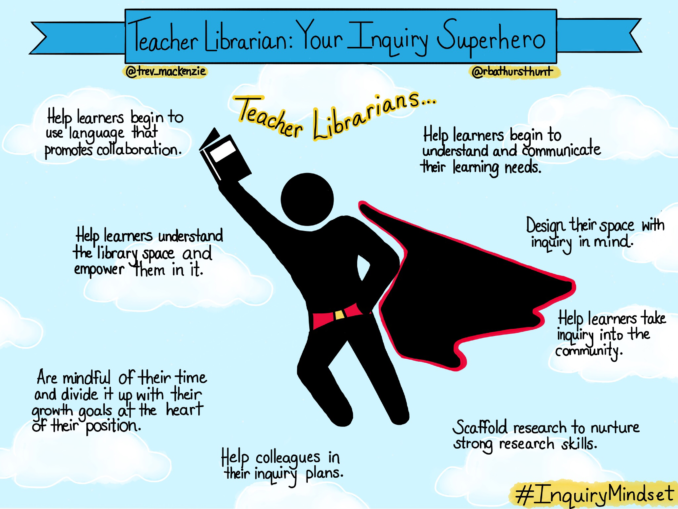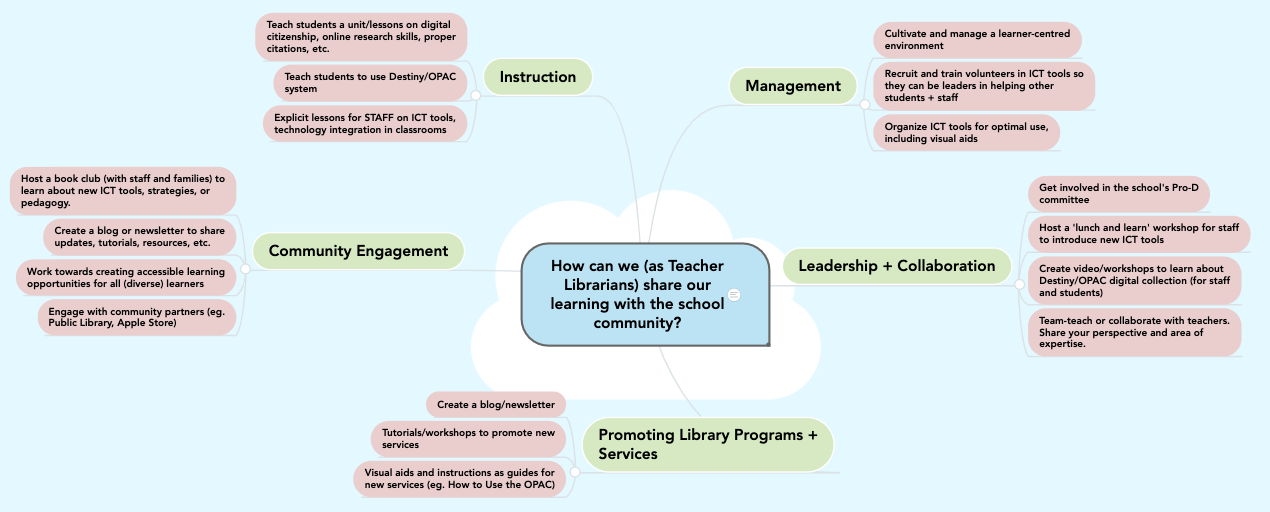Topic: Sharing My Professional Development with the School Community
How can we, as educators and Teacher-Librarians share what we’ve learned with our wider communities of practices? What tools and strategies are best implemented to meet the professional development of staff?
First and foremost, I believe it is important to cultivate meaningful relationships with the school community, including staff, students, and families. In my opinion, this is the best way for the TL to understand the needs of the community, and therefore, the tools and strategies needed to support their learning. Once we learn about the school community, we can strategically plan how to support their professional growth. A strong relationship will also ensure that members of the community see you as a valuable source of information. I included the image below (Inquiry Superhero) because it also applies to Teacher-Librarians in the context of providing professional development to staff, or sharing their learning with the school community.

kqed.org
One major takeaway I have learned from the various Teacher Librarianship diploma program so far is that the role of the Teacher-Librarian has evolved to be multi-faceted, where the TL is responsible for teaching, managing, advocating, and much more. According to the International Federation of Library Associations and Institutions (IFLA) School Library Guidelines (2015), a Teacher-Librarians roles can be summed up into five broad categories:
- Instruction
- Management
- Leadership and Collaboration
- Community Engagement
- Promoting Library Programs and Services.
At first, I wanted to focus only on one or two of these categories, but as I tried to narrow it down, I realized ALL of them play a part in the context of supporting the learning communities’ professional development. In the visual I created, ICT education and professional development can be integrated throughout the five categories. Click on the mind map below to be redirected to a larger (and more readable) image. Created on MindMeister.com.
How can we best respond to the needs of our staff, in their wide spectrum of abilities and experiences, with the most appropriate and useful professional development?
I believe that much like our students with diverse learning needs and skill levels, staff members also have a wide spectrum of abilities, experiences, and learning style. In order to best respond to this, I would scaffold the professional development workshops so that everyone feels they are making the best use of their time by participating. For example, I once attended a workshop to learn about a new district-wide digital portfolio program. I created an account on my own and played around with the program before attending, in hopes of jumping into the more technical details with the specialist at the workshop . Unfortunately, most of the hour-long workshop was spent focusing on how to access the site, how to create an account, how to log in, and other basic steps. I realize that a basic beginner lesson is crucial in order to set the foundation of learning a new skill or program, but I can also see how it may avert some teachers from attending workshops in the future. To address this issue, I would try to host various levelled workshops when teaching staff about an ICT tool or strategy. To relate it to classroom instruction, it’s like having levelled math lessons: start with the basics and build on previous lessons when students are ready. In the staff pro-d setting, I would first have a lesson with basic information and skills, then the subsequent lessons would go into more detail, with each one building on the previous. I realize that this would take more time and staff may not want to commit to a whole series of workshops, but I would share a description of what will be covered in each session so that staff could decide which one(s) they would like to attend. That way, those who need the most support can have it, and those who just want to develop specific skills can come on the appropriate days. I would also include various opportunities for participants to talk, share, and practice the new skills that they are learning, as well as provide plenty of visual aids.
The video below outlines “scaffolding” for student success. I believe the same framework should be used for teacher professional development as well.
Scaffolding for Student Success
References:
International Federation of Library Associations and Institutions. (2015). IFLA School Library Guidelines. 2nd revised edition.
Scaffolding for student success. (2018) Retrieved on 23 July 2021 from https://www.youtube.com/watch?v=uKLDjmPk_RE.

I love the formatting of your post. It’s so easy to read because and the images fully support your thoughts in such a fun way.
The process that you outlined is so similar as to how we should teach our students. Scaffolding is so important when teaching something new, especially to those who may have difficulties remembering the process of. So, why wouldn’t we treat educators or our colleagues in the exact same manner (besides those persons who believe that they are above being told what to do or to change their ways)?.
Great points Saliha! Building trusting, collegial relationships is definitely the key to all of this. Showing yourself as a humble learner who is on the same journey as everyone else is so important. Love the Trevor Mackenzie Superhero graphic!
– Janet Smith
Hi Saliha,
I agree that it is important to first create good relationships before assessing needs as it makes it way more effective.
Scaffolding the professional development opportunities is a must! I wish this idea was more common. Did you share this blog post on twitter?
Alex D.
A strong post that shares some important insight about supporting others. I appreciate the mind map you created and shared. What a great way to share your thinking while modelling a new tool. I also appreciate your ideas about levelled pro-d sessions. I agree that whether working with students or adults, meeting people where they are and helping them move along is the key.